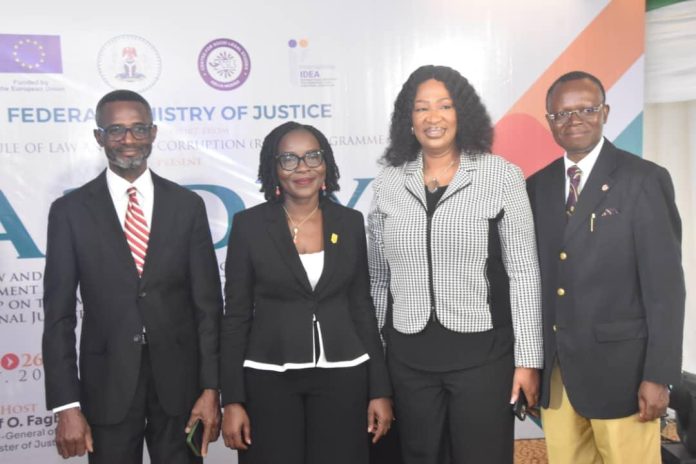The Federal Government has announced plans to establish a National Minimum Standard for the implementation of the Administration of Criminal Justice Act (ACJA) in Nigeria. This move was disclosed by the Honourable Attorney General of the Federation and Minister of Justice (HAGF), Lateef Fagbemi, SAN, during the opening of a three-day review and validation workshop for the National Minimum Standards Document, held on Tuesday, 24th September 2024.
Represented by the Solicitor General of the Federation and Permanent Secretary, Mrs. Beatrice Jedy-Agba, OON, mni, the HAGF noted that the workshop marks a significant step in Nigeria’s ongoing efforts to reform its criminal justice system. He emphasized the need to improve the administration of justice to ensure timely, efficient processes while protecting the rights of suspects, defendants, and victims.
In his keynote address, Mrs. Jedy-Agba reiterated that the ACJA, enacted in 2015, was designed to harmonize criminal justice reforms across the Federation. She emphasized that a uniform implementation of the Act would prevent criminals from evading justice by exploiting jurisdictional loopholes, a practice known as “forum shopping.” With the introduction of National Minimum Standards, she said, criminal justice procedures across federal and state courts would be aligned, bolstering efforts to combat crime and contributing to Nigeria’s socio-economic development.
“The adoption of these minimum standards will help ensure that courts apply consistent procedures, thereby preventing criminals from escaping justice by moving between states,” the HAGF remarked.
The National Working Group for the implementation of ACJA reforms was also inaugurated during the event. The group, comprising representatives from federal and state governments, civil society organizations, legal professionals, and other key stakeholders, will facilitate cooperation across the justice sector. Its formation follows recommendations from the National Stakeholders Forum held in October 2023, which highlighted the need for uniformity in criminal justice processes nationwide.
The Honourable Minister urged all stakeholders to collaborate closely with the Working Group to address challenges like court congestion, delayed trials, and the lack of accessible criminal justice data. He further encouraged the use of technology to modernize the system.
In her welcome address, Mrs. Leticia Ayoola-Daniels, Director of the Administration of Criminal Justice and Reform Department at the Federal Ministry of Justice, stressed the urgency of finalizing a unified framework to address persistent issues such as inefficient trials and the absence of standardized criminal procedures.
She commended the contributions of international partners, including the European Union, International IDEA, the Rule of Law and Anti-Corruption Programme (RoLAC), and other stakeholders who supported the initiative.
Goodwill messages were delivered by representatives from RoLAC, the Nigerian Bar Association, State Attorneys-General, the Independent Corrupt Practices Commission (ICPC), the Economic and Financial Crimes Commission (EFCC), the Nigerian Correctional Service (NCS), and the Nigerian Police, all of whom expressed their support for the initiative.




